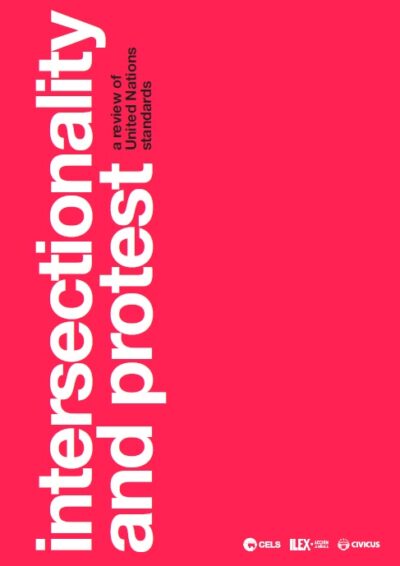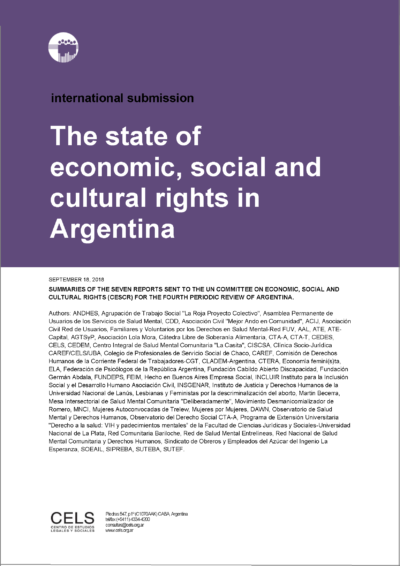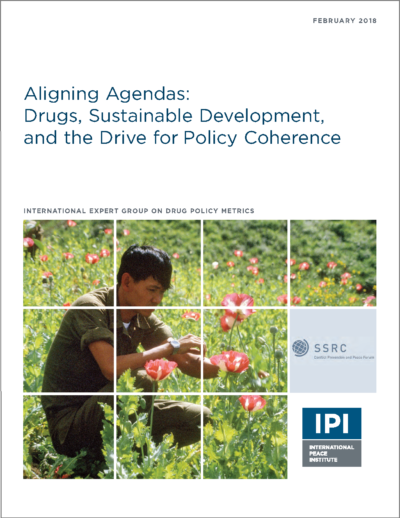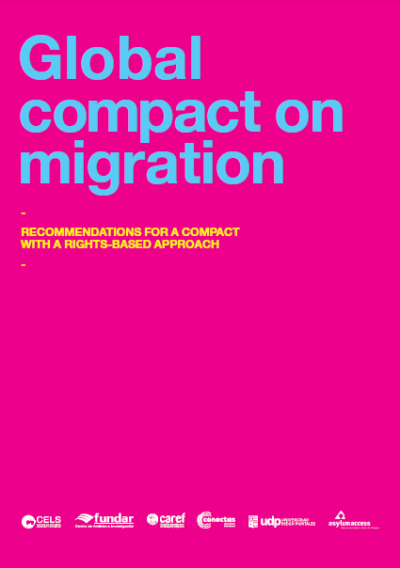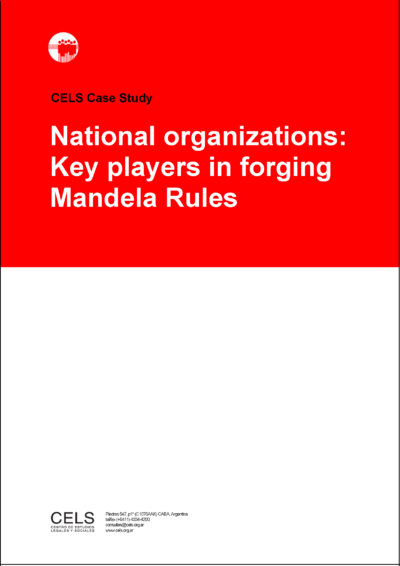Repression as policy: Violence, arbitrary detentions, and the use of dangerous weapons in Argentina
The mobilization outside Congress demanding a pension increase on March 12 was violently repressed in a large-scale operation involving five security forces. Security Minister Patricia Bullrich had warned in advance that there would be repression. Tear gas, rubber bullets, and arbitrary detentions marked a day in which the government justified its actions by invoking the narrative of an “attempted coup.”
UN: we denounced the restrictions on civic space and the unconstitutionality of the IMF loan at the human rights council
During the 58th session of the Human Rights Council, CELS participated in two interactive dialogues with Special Rapporteurs to present on the current situation in Argentina.
Intersectionality and protest
Autor/a: CELS, ILEX, CIVICUS
16 pages
ver más
Milei’s government fails to guarantee children’s rights
This is what the UN Committee on the Rights of the Child said in its evaluation of Argentina. The Committee expressed concern about the official decision not to distribute food and funds to soup kitchens and community spaces. It also criticized the increase in child poverty, the repression of protests and the bill to lower the age of criminal responsibility.
We denounced the attack on memory policies before the United Nations
Human rights organizations held a meeting with the UN Working Group on Enforced Disappearances where we warned about this government’s regressive speech and measures against the policies of memory, truth and justice.
CELS goes before the UN to denounce setbacks in rights to protest, housing and the impact of Argentina’s debt
The denouncement was made during the 55th session of the Human Rights Council in Geneva, Switzerland. We spoke with special rapporteurs about how the government’s economic and social policies degrade the living conditions of the majority of Argentines.
We alerted the Committee on the Elimination of all forms of Racial Discrimination about the closure of the INADI
We sent a statement to CERD expressing our concern about the closure of the INADI, the entity in charge of the implementation of Argentina’s international commitments on racial discrimination, and about the statements made by different authorities about this.
On the situation of human rights in Venezuela
Given the persecution of human rights defenders and the expulsion of United Nations mechanisms, we take a stance together with other civil society organizations about this serious precedent in the region.
UN urges government to review the omnibus bill and protocol, saying they criminalize protest
The special rapporteurs expressed their concern over the Ministry of Security resolution and proposed legal reforms criminalizing protest. They called on the Argentine State to comply with international human rights standards.
With more than 1,700 signatures from organizations, we condemn the protocol against protest before the UN and the IACHR
Jointly with trade unions, social movements, human rights organizations, and entities focused on social, trade, environmental, indigenous, migrant, transfeminist, religious, children’s, student, and political causes, we have requested international mechanisms to demand the Argentine State stop the implementation of new regulations that seek to restrict and repress public protest. These submissions were also supported by 15,000 individual signatures.
The impact of drug policies: time to listen to the Global South
CELS joined organizations from Asia, Africa and Latin America to contribute our regional perspectives to the 54th session of the Human Rights Council.
Migrants: serious human rights violations at international borders
Alongside 195 organizations worldwide, we demand that the UN establish an independent monitoring mechanism to investigate the treatment of migrants in border areas and its underlying structural causes.
UN universal periodic review: What is Argentina’s human rights situation?
Argentina will be reviewed in the United Nations Human Rights Council on Monday, January 23. It will have to report to its peers on compliance with its international commitments on human rights matters. CELS, along with other organizations, produced reports as prior contributions for the assessment and recommendations to be produced by this mechanism. We will also be present at the session in Geneva.
UN Committee Decries Racial Discrimination in Global COVID-19 Vaccine Access
Germany, Switzerland, UK, and US Called to Account for Not Supporting a Comprehensive Waiver of Intellectual Property and Mandating Pharmaceuticals Transfer Technology.
Campaigners petition UN to investigate racial and gender discrimination in global COVID-19 vaccine roll-out
US, UK, Germany, Norway, and Switzerland in violation of international human rights law in “prolonging the pandemic” ahead of vital World Trade Organisation meeting .
Bolivia: Human Rights Organizations Publish Report to UN on the Sacaba and Senkata Massacres
After receiving the document, the international organization urged Bolivia to investigate the violations committed by Jeanine Áñez’s facto government. These crimes remain unpunished to this day.
Complaint Filed With the UN Against the Brazilian Government on Military Coup Commemoration
Along with the Vladimir Herzog Institute and five other organizations, we denounced the Brazilian authorities for their declarations on the anniversary of the 1964 military coup to the Special Rapporteur of The United Nations on the promotion of truth, justice, reparation and guarantees of non-recurrence.
Deported Mother Granted Return to Argentina to Reunite with Children
Vanessa’s deportation is proof of the inherent threats involved in Argentina’s immigration policy as modified by presidential decree. The decision to revert her expulsion is a step forward towards the restauration of children’s rights.
UN urges Argentina to derogate and suspend decree that violates migrant rights
The Committee of the Convention on Migrant Workers (CMW) determined that the decree breaches international treaty ratified by Argentina in 2007.
The Global Compact for Migration was adopted
More than 160 UN member countries endorsed the Global Compact for Migration at an intergovernmental conference held on December 10-11. This agreement includes some important advances, above all in a context of growing xenophobia and nationalism in Latin America and the world.
The militarization of drug policies worsens human rights violations
At an intersessional meeting of the Commision on Narcotic Drugs (CND) of the United Nations, CELS made a presentation addressing the “fight” against drug trafficking, militarization of public security and its harmful effects on human rights. The discussions at the CND will culminate in March with a review of the global drug strategy over the last decade.
Urgent action needed over US threats to the International Criminal Court
US National Security Adviser John Bolton made explicit and concrete threats against ICC judges, prosecutors and personnel if they proceed with an investigation into alleged war crimes committed by US forces in Afghanistan. A group of national and international organizations requested that the UN Assistant Secretary-General for Human Rights take urgent action in response. Our joint letter to him follows.
The state of economic, social and cultural rights in Argentina
Autor/a: Various
10 pgs.
ver más
Global Compact for Migration: Progress, shortcomings and the way forward
The new Global Compact represents a turning point in the international management of migration. But much work remains to ensure that its implementation is focused on the protection of the rights of migrants.
Treating migration as a security problem violates human rights
During the final round of negotiations on the Global Compact for Migration, 40 organizations urged UN member states to ensure that the accord fully incorporate a rights-based approach. The last draft includes changes that reinforce a focus on control and security. If this is validated, countries will have wasted a historic opportunity to fuel a paradigm shift.
Response to the US about its withdrawal from the UN Human Rights Council
The US ambassador to the UN said that her country’s decision to abandon the Human Rights Council was partly due to the opposition of 18 organizations to the Council reform proposal backed by Washington. CELS, one of these organizations, responded to her.
Legal abortion: UN bodies give their backing
The Working Group on discrimination against women urged the Argentine state to approve the bill to legalize the voluntary interruption of pregnancy. This is the latest in a series of such recommendations by UN bodies, based on human rights considerations.
Legal abortion: Legislating for the future
CELS participated in the last hearing in Congress on legal abortion. Edurne Cárdenas spoke there about the need to guarantee access to this right.
Global Compact negotiations: States discuss migratory regularization
At the fourth of six rounds of negotiations on the Global Compact for Migration, state delegations from various regions defended the importance of addressing regularization procedures.
UN Human Rights Council urged to investigate violence in Palestine
“Enough is Enough”: 95 civil society organizations call on the UN Human Rights Council to urgently launch a Commission of Inquiry to investigate violence against protesters in Palestine.
A Global Compact to return migrants?
The latest draft of the Global Compact for Migration avoids mentioning the regularization of those who are already living in their destination country, which is a serious omission. Opinion piece by Camila Barretto Maia, Diego Morales y Raísa Ortiz Cetra.
“Argentina is responsible for widespread and persistent violations of the Convention against torture”
The UN Special Rapporteur on torture, upon concluding his visit to the country, said that detention conditions in provincial police stations and prisons “severely contravene international standards and are incompatible with human dignity.” He also denounced the “degrading” conditions in the Melchor Romero psychiatric hospital and police violence in low-income neighborhoods. At the same time, he urged the Argentine state to allocate “sufficient resources to ensure the timely processing and adjudication of the remaining cases and trials for crimes against humanity.”
Incorporating human rights perspectives into housing strategies
The UN Special Rapporteur on adequate housing presented a report on housing strategies that promote socioeconomic equality and inclusion. It mentions examples from numerous countries, including Argentina.
Global Compact for Migration: Stop the hypocrisy and listen to the Global South
UN member states began negotiations on the Global Compact for Migration. This agreement represents an unprecedented opportunity to establish specific obligations for protecting the human rights of migrant persons, but the process faces numerous challenges. Opinion piece by Camila Barretto Maia, Diego Morales and Raísa Ortiz Cetra.
Aligning Agendas: Drugs, Sustainable Development, and the Drive for Policy Coherence
Autor/a: International Expert Group on Drug Policy Metrics
28 pgs.
ver más
Global Compact on migration: Presenting proposals centered on the rights of migrants
At the UN, States will begin negotiating the Global Compact on migration. CELS and five other organizations present concrete measures that the Compact should include to guarantee migrants’ rights.
Global compact on migration: Recommendations for a compact with a rights-based approach
Autor/a: Various
45 pgs.
ver más
UN Briefing: Pushing ahead to incorporate human rights into drug policy
We debated about what the UN can do to introduce human rights in the implementation and monitoring of drug policies during a briefing in Geneva.
The Argentine state will be evaluated at the UN
National organizations presented their assessments for the Universal Periodic Review (UPR), a peer evaluation of the human rights situation in each of the UN’s 193 member states. Argentina will be evaluated in early November.
Santiago Maldonado disappeared 50 days ago
A follow-up report is presented to the UN Committee on Enforced Disappearances regarding the Argentine state’s response to the disappearance of Santiago Maldonado.
Santiago Maldonado’s Disappearance in Argentina: The UN Committee on Enforced Disappearances demands urgent state action
The UN Committee determined that the disappearance of Santiago Maldonado requires “urgent action by the state party to search for and locate him” and to identify those responsible.
IACHR granted precautionary measure in favor of Argentine social leader Milagro Sala
The Inter-American Commission on Human Rights (IACHR) granted the precautionary measure in favor of Argentine social leader Milagro Sala, making it clear that she cannot remain in prison any longer. Sala has been arbitrarily detained since January 16, 2016, when she was arrested over a protest. The precautionary measure was requested by Amnesty International, Andhes and CELS.
Debate on the Global Compact: Human Rights Must Guide Migration Policies
The Global Compact on migration could be an unprecedented intergovernmental tool but the majority of states have expressed an interest in intensifying the current model, centered on controls and security, instead of transforming it.
How can we harmonize drug policies with the Sustainable Development Goals?
The construction of new drug policy indicators could help to achieve the sustainable development agenda. The situation of women incarcerated for drug-related offenses is especially worrisome.
A Global Compact on the rights of migrant persons
“Regulating migration” must stop being equated with impeding or criminalizing migrants. In regional and international forums, we promote alternative models that guarantee their rights.
Argentine state faces UN Committee Against Torture
The Argentine state’s compliance with the Convention against Torture will be evaluated on Wednesday, April 26 and Thursday, April 27. CELS submitted a report to the UN Committee that carries out the evaluation and contributed to two reports produced with other organizations.
Milagro Sala: One year of arbitrary detention
Joint press release by CELS, Amnistía Internacional and ANDHES.
National Organizations: Key Players in Forging Mandela Rules
Autor/a: CELS
4 pgs.
ver más
Over 270 human rights organizations worldwide express support for UN Committee on Enforced Disappearances
Organizations from 27 countries sent a statement of support for the Committee on Enforced Disappearances and urged that its mandate be renewed.
UN asks Argentina to take action to guarantee rights of women and LBTI persons
The UN Committee on the Elimination of Discrimination against Women released its concluding observations regarding Argentina.


